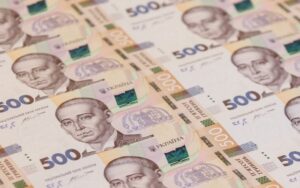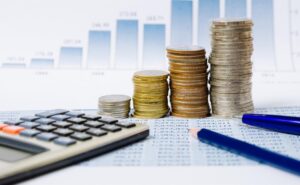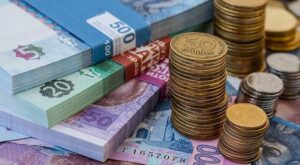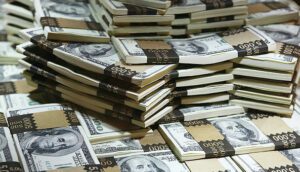
The state budget deficit of Ukraine in December 2023 amounted to a record UAH 285 billion, compared to UAH 145.1 billion in November and UAH 98.4 billion in October, according to the State Treasury. It specified that the general fund deficit jumped to UAH 274.4 billion from UAH 162.5 billion in November and UAH 87.7 billion in October. The Ministry of Finance noted that the cash expenditures of the state budget in December also became a record and exceeded UAH 548.2 billion compared to UAH 337.9 billion in November and UAH 292.1 billion in October.
The general fund expenditures increased to UAH 397.7 billion from UAH 286.3 billion in November and UAH 228.1 billion in October.
According to the Ministry of Finance, in December 2023, revenues to the general fund of the state budget increased slightly to UAH 127.1 billion from UAH 121.7 billion in November, which is, however, less than UAH 139.4 billion in October, while US grant international assistance amounted to UAH 20.5 billion, while in November it was not, and in October it amounted to UAH 42 billion.
In total, in 2023, state budget revenues amounted to UAH 2.67 trillion, including UAH 1.66 trillion from the general fund, of which UAH 425.4 billion was international grant aid (the US – UAH 400.5 billion).
Last year’s cash expenditures of the state budget exceeded UAH 4 trillion, including UAH 3.03 trillion from the general fund, or 98% of the plan, compared to 93% a month earlier.
According to the Ministry of Finance, in 2023, the state budget was executed with a deficit of UAH 1.33 trillion, including a deficit of UAH 1.36 trillion in the general fund against the deficit of UAH 1.83 trillion planned in the general fund plan.
In 2022, the state budget was executed with a deficit of UAH 911.1 billion, including UAH 909.5 billion in the general fund, including UAH 99 billion and UAH 101.3 billion in December, respectively, and in pre-war 2021, the deficit of the general fund of the state budget of Ukraine was equal to UAH 166.8 billion.
State budget expenditures in 2022 amounted to UAH 2.70 trillion, including UAH 2.41 trillion for the general fund, which was 91.7% higher than in 2021. In December 2022, cash budget expenditures amounted to UAH 408.8 billion, including UAH 330.5 billion for the general fund.
The general fund of the state budget in 2022 received UAH 1.491 trillion, of which grant funding amounted to UAH 480.6 billion, while in 2021 revenues amounted to UAH 1.084 trillion. In December 2022, the general fund revenues amounted to UAH 229.2 billion, of which UAH 138.4 billion was grant aid.
As reported, on October 6, the Verkhovna Rada approved the next amendments to the state budget for 2023, mainly to increase spending on the security and defense sector. The new amount of state budget expenditures amounted to UAH 3 trillion 393.0 billion, including UAH 3 trillion 94.5 billion for the general fund, while revenues amounted to UAH 1 trillion 416.4 billion, including UAH 1 trillion 253.9 billion for the general fund. The limit for the deficit was set at UAH 2 trillion 10.35 billion, including UAH 1 trillion 834.6 billion for the general fund.
For more information on the situation in the Ukrainian and global economy, please see the video on the Experts Club YouTube channel at the link: https://www.youtube.com/watch?v=byJnfmie7bM
You can subscribe to the channel here: https://www.youtube.com/@ExpertsClub

The macro forecast of the Ministry of Economy, which formed the basis of the draft state budget-2024, assumes a sharp improvement in the security situation from the second half of next year and, as one of the consequences, an acceleration of economic growth to 5% in 2024 and 7-7.5% in 2025-2026.
“Further economic development of Ukraine depends on the duration and active phase of military operations… Thanks to the military successes of Ukrainian defenders and protectors, a significant reduction of security risks is expected from the second half of 2024, which will positively affect the indicators of economic and social development of Ukraine for 2025-2026,” the document says.
According to the forecast, dated mid-June this year, inflation (at the end of the year) will fall to 10.8% next year, to 7% in 2025 and 5.8% in 2026.
Other estimates include unemployment falling from 18.8% this year to 10.8% in 2026.
In the formation of the revenue side is expected to increase revenues from the National Bank in 2025 to 103.9 billion UAH from 17.7 billion UAH in 2024 with a subsequent reduction to 15.4 billion UAH.
As reported, the government on Friday approved the draft state budget-2024 with revenues of UAH 1 trillion 746.3 billion, expenditures of UAH 3 trillion 108.2 billion and a marginal deficit of UAH 1 trillion 593.6 billion.
In relation to the current law on the state budget-2023, it is proposed to increase revenues by 25.6%, expenditures – by 7.6%, and reduce the deficit by 7.3%.
At the same time, this week the government submitted to the Rada a draft law No. 10038 with amendments to the state budget-2023 to increase its expenditures by 328.5 billion hryvnias due to the growth of internal loans by 207.6 billion hryvnias and external loans by 91.2 billion hryvnias.
Compared to it, revenues in the draft state budget-2024 are higher by 23.3%, or by 329.9 billion UAH, while expenditures are lower by 2.5%, or by 84 billion UAH, and the deficit – by 20.7%, or 416.8 billion UAH.
Experts Club Research Project and Maxim Urakin recently released an analytical video on the economy of Ukraine and the world
You can subscribe to the Experts Club YouTube channel by following the link – https://www.youtube.com/@ExpertsClub

Representatives of Ukraine’s tourism industry in January-June 2023 paid 897.848 million UAH to the budget, the press service of the State Agency for Tourism Development (SART) told Interfax-Ukraine on Thursday.
It is specified that this is 11% more than for the first half of 2022 (809.435 million UAH), and 17.5% less than for the first half of 2021, when 1 billion 88.945 million UAH was transferred to the state budget from the tourism industry.
The press release informs that in this reporting period, the total number of taxpayers engaged in tourism activities decreased by 23% compared to January-June last year. At the same time, the number of legal entities decreased by 28%, while the number of individuals – by 21%. If we compare this indicator with the same period of 2021, the total reduction in the number of taxpayers amounted to 36% (-45% for legal entities and -32% for individuals).
The largest share of revenues to the state budget was provided by hotels – 63%, or 569.828 million UAH, while in January-June last year they paid 460.498 million UAH, and for the same period in 2021 – 665.420 million UAH.
At the same time, in January-June this year decreased the amount of tax paid from the activities of tourist bases and children’s recreation camps, which provided 60.428 million UAH of deductions against 73.012 million UAH for the same period last year and 178.921 million UAH for the first two quarters of 2021.
The amount of taxes paid from the activities of campgrounds and parking lots for RVs for two quarters of this year almost doubled to UAH 1.492 million against UAH 731 thousand in January-June 2022, but decreased by 26% compared to the first half of 2021.

The state budget deficit of Ukraine in April 2023 increased to 88.3 billion UAH from 32.6 billion UAH in April and 59.2 billion UAH in March, the Ministry of Finance said on its website on Friday.
It specified that the general fund deficit increased to 91.6 billion UAH from 65.6 billion UAH and 72.6 billion UAH respectively.
The Ministry of Finance with reference to the operational data of the State Treasury specified that the cash expenditures of the state budget in May also increased to 364.7 billion UAH from 295.8 billion UAH in April and 300.8 billion UAH in March.
The same picture is in the general fund: the growth to 277.7 billion UAH from 229.7 billion UAH in April and 225.2 billion UAH in March.
As pointed out by the Ministry of Finance, in May 2023, the receipts to the general fund of the state budget increased again to 184 billion UAH from 162.8 billion UAH in April and 152.2 billion UAH in March.
At the same time, international grant assistance provided by the USA amounted to the same UAH 45.7 billion as in the previous two months.
During January-May this year, cash expenditures of the state budget reached UAH 1 trillion 407.9 billion, including general fund – UAH 1 trillion 142.9 billion, or 95% of budget expenditures against 93.8% in April, while state budget revenues amounted to UAH 1,060.9 billion, of which UAH 225 billion were grant international aid.
During those five months, the state budget was executed with a deficit of UAH 341.2 billion, including the general fund deficit of UAH 401.9 billion against the planned schedule of the general fund deficit of UAH 713.9 billion.
As reported, the Verkhovna Rada on March 21, 2023 increased the state budget expenditures by 487 billion UAH, revenues – by 61 billion UAH, which led to an increase in the deficit by 419 billion UAH.
Now the state budget revenues are set at 1 trillion 390.4 billion UAH, including the general fund – 1 trillion 233.8 billion UAH, while the expenditures are 3 trillion 75.9 billion UAH and 2 trillion 783.4 billion UAH respectively.
The state budget deficit is set at UAH 1 trillion 719.7 billion, including the general fund at UAH 1 trillion 543.9 billion. It is assumed that it will be financed almost entirely by external borrowing of $42 billion.
The Ministry of Finance specified that the value added tax (VAT) from goods produced in Ukraine in May brought 17.3 billion UAH compared to 16.6 billion UAH in April, but VAT refund again decreased from 11.4 billion UAH to 9.9 billion UAH.
The import VAT added another 28.5 billion UAH (25.1 billion UAH in April), personal income tax and military levy 14.1 billion UAH (13.4 billion UAH), royalties for subsoil use 4.5 billion UAH (4.9 billion UAH), and corporate income tax 28.5 billion UAH (2.3 billion UAH) to the budget.
Excise tax brought another 9.5 billion UAH (9.9 billion UAH) to the state budget; import and export duties accounted for 2.5 billion UAH (2.2 billion UAH), and the tax administration exceeded the estimate by 9.1%, or 8.4 billion UAH.
Besides, if in April the general fund of the state budget received another 35.9 billion UAH from the National Bank in the form of transferring part of profits (and the same amount was transferred to the Fund of liquidation of consequences of armed aggression of the Russian Federation in the special fund of the state budget), in May the general fund supported PrivatBank with dividends of 24.2 billion UAH.
Receipts of ERUs to the Pension Fund and social insurance funds in May 2023 rose to 38.5 billion UAH from 37.9 billion UAH in March, added the Ministry of Finance.
According to him, the actual state borrowing in the general fund of the state budget in May 2023 decreased to 142 billion UAH from 193.4 billion UAH in April and 176.7 billion UAH in March, and a total of 738.9 billion UAH for five months, or 87.9% of the plan.
Of which UAH 240.3 billion (UAH 68.6 billion in May) were received from placement of government bonds for five months, including UAH 80.3 billion (UAH 40.7 billion), or $1027.7 million, and EUR86.9 million ($616.4 million and EUR418 million) in foreign currency.
Credit proceeds from external sources for five months amounted to UAH 425.2 billion, including UAH 73.4 billion in May.
At that, payments on state debt repayment in May 2023 increased to 55.1 billion UAH from 46 billion UAH in April, and on servicing – to 45.7 billion UAH from 13.9 billion UAH.
The Ministry of Finance stressed that the rollover of OVDPs in five months was full: the funds raised from OVDPs allowed to fully cover the needs for payments on them.

Ukraine’s state budget deficit in December due to the receipt of a significant amount of grants decreased to 99 billion UAH from a record level of 170 billion UAH a month earlier, including the general fund – to 101.3 billion UAH from 163.3 billion UAH, the Ministry of Finance said on its website.
According to its operational data, in general, the state budget of Ukraine in 2022 executed with a deficit of 911.1 billion UAH, including the general fund – 909.5 billion UAH against the planned in the estimate 1399.5 billion UAH.
The Ministry of Finance specified that the actual state borrowings to the general fund of the state budget for 2022 amounted to 1261.1 billion UAH or 67.3% of the planned for this period, including from the placement of government bonds, 666.9 billion UAH, of which 103.9 billion UAH in foreign currency ($2.1 billion and EUR 980.6 million), and by 400 billion UAH hryvnia securities were purchased by the National Bank.
According to preliminary data of the Ministry of Finance, about $31 billion was financed from foreign sources, including about $14.3 billion, or 480.6 billion UAH in grants, which are recorded as state budget revenues.
As reported, in 2021, the deficit of the general fund of the state budget of Ukraine was 166.8 billion UAH, including in December – 108.1 billion UAH.
The state budget of Ukraine for 2023 was approved with a marginal deficit of 1296.5 billion UAH, including for the general fund – 1124.6 billion UAH.

Prime Minister of Ukraine Denys Shmyhal says that the state budget has received a $1.5 billion grant from the United States from the World Bank Trust Fund.
“The state budget received a grant in the amount of $1.5 billion. This is the last tranche of $4.5 billion from the United States from the World Bank Trust Fund,” Shmygal wrote on Twitter.
According to him, the funds will be used to reimburse budgetary expenses for pension payments and social assistance programs.
The prime minister thanked US President Joseph Biden for supporting Ukraine.